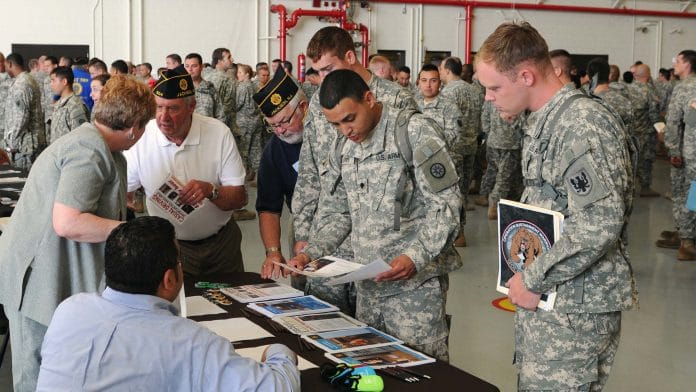Military personnel face difficult challenges during their service careers. When their tour is finished, civilian life brings its own challenges. Remaining calm under pressure – whether from enemy fire or an irritating debt collector – is possible with training and a clear plan of action.
Veterans have specific problems
Where do veterans work when they finish their service? Lack of a job is the biggest financial stressor most veterans face. In fact, more than 65% of service personnel finish their tours without a job. Without a steady income, there are other problems some veterans face which can become critical issues.
Housing problems
Life in the Armed Forces usually means regular relocations. Service personnel move from one location to another every few years. Moving so frequently can cause mortgage difficulties.
Poor credit history
Another struggle for many servicemen and women is their credit history. Many choose to use credit cards and payment plans during their active duty. While these are convenient for a life on the move, the bills will keep rolling in for months and years to come. The payments can become unaffordable once the military paychecks stop coming in.
Mental health during the transition to civilian life
Two out of three veterans experience a difficult transition from life in the military to civilian life. Everything changes all at once. There are new schedules – or no schedule. There are new co-workers – or no co-workers. There are new rules – or no regulations to be followed. All of these require a mindset shift for the veteran leaving active duty.
Improvise, Adapt, and Overcome
The Marine mantra has value for veterans moving into civilian life. In the early days, they can learn to improvise a way to live as they adjust to all the changes. Then, they can adapt to a new routine, a new job, and new friends. Finally, veterans are well-positioned to overcome serious financial challenges because most veterans are natural savers. They plan for disasters and put money aside.
Plan for the mission
A budget is a necessity for managing money well. Thankfully, creating a budget is easy. There are many budgeting tools to simplify the job. Any of these can help make a workable plan for how to spend, save, and invest money.
Once the budget is calculated, it needs to be balanced. The income must be at least as high as the expenditure. Raise the income or lower the outgoings until the budget looks good. A balanced budget is the best tool for avoiding financial difficulty.
Roll the debt snowball
Veterans typically have more unsecured debt than civilians. Unsecured debt is money owed to someone for which something cannot be sold to pay it off.
Avoiding money problems means getting rid of debt. There are four proven ways to pay off debt:
- Refinance a mortgage – The bank may refinance a mortgage if there is equity in the property. A mortgage usually has one of the lowest interest rates available. The length of repayment may bring monthly costs down. Do this first if possible.
- Consolidate the debt – Many organizations offer this service. They will combine multiple debts into one package with one payment. This may be easier to manage even if the total amount owed doesn’t decrease.
- Renegotiate the terms – Credit card companies want money. Offering to repay the outstanding balance at a lower interest rate saves money and lowers the payments. Transfer offers from other credit card companies make good leverage for negotiations.
- Snowball the debts – Make a list of the debts in order from smallest to largest. Apply all available extra funds to paying off the smallest debt while continuing to meet the monthly payments of the other debts. After the smallest debt is cleared, apply its payment to the next smallest. Rinse and repeat until all the debts are repaid.
These four strategies are useful for veterans adapting to the new requirements of civilian life. Executing these plans will lead to financial security.
Overcoming two big enemies
There are two huge problems a veteran could encounter in their financial life: foreclosure and bankruptcy. Here is what do when the money SHTF.
How to avoid foreclosure
Foreclosure happens when someone does not pay their mortgage. The bank will repossess the house, sell it, apply the proceeds to the mortgage, and then chase the debtor for any remaining balance. Sometimes, the bank can repossess the home and not sell it. Either way, the home is lost.
Foreclosure is bad.
Avoiding foreclosure starts with budgeting and making payments. If the situation is all snarled up, then there are more things you can do to avoid foreclosure. Here is a short list:
- Contact the bank and ask for an extension. A 15-day grace period is usually available.
- Work through the alternatives with the bank. The bank may have compromise solutions.
- Ask for help. The VA or other organizations may be able to offer short-term relief.
Foreclosure is a long process and there is time to avoid it. Don’t delay resolving the problem or ignore the issue. Being proactive could save the day.
Bankruptcy as a last resort
Sometimes, when everything else has failed, the only way out may be to declare bankruptcy. No one wakes up in the morning wanting to do this!
There are different forms of bankruptcy, though. Understanding the differences between chapter seven and chapter eleven bankruptcy could help mitigate the potential disasters.
Assuming none of the options already mentioned have helped, here are the four major classes of bankruptcy:
- Chapter 7 – Liquidation of assets
- Chapter 11 – Reorganization of assets
- Chapter 12 – Adjustment of debts specifically for family farmers and fishermen
- Chapter 13 – Adjustment of debts for an individual or small business
Chapter seven and eleven bankruptcies are the most common. If finances have degraded to this state, then seeking professional advice is really the best option.
Conclusion
Knowing what to do when the money SHTF is a solid way to find peace in life. Money worries are terrible. Veterans may start their civilian lives with some extra difficulties. Following these steps will help avoid the worst possible outcomes. A peaceful life waits for those who master command of their finances.
All content herein is owned by author exclusively. Expressed opinions are NOT necessarily the views of VNR, authors, affiliates, advertisers, sponsors, partners, technicians, or VT Network. Some content may be satirical in nature.
All images within are full responsibility of the author and NOT VNR.
Read Full Policy Notice - Comment Policy





























